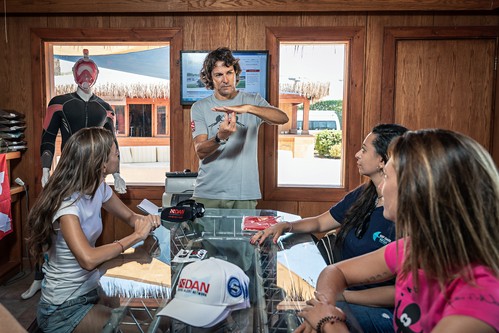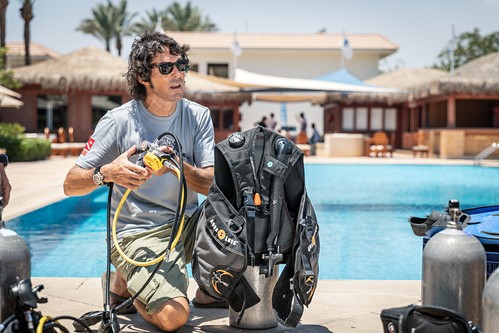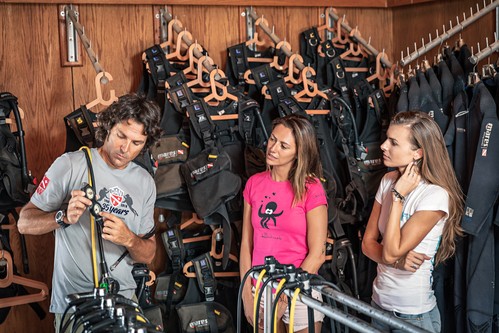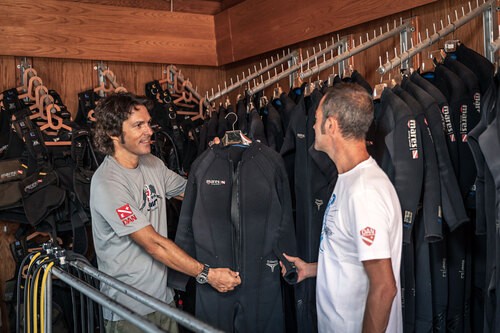Diving Etiquette

At The Dive Centre
EDUCATION | TEXT BY Claudio Di Manao
You made it right on time: you got off the plane, looked forward to your travel bag with your dive equipment, and nearly cried in relief when you spotted it on the belt.
When you arrived at the hotel, you grabbed your key but didn't head to your room: you rushed to the diving centre first, with your Advanced OWD certificate between your teeth. You finally discovered that a wreck dive was scheduled for the following day and booked your place.
EDUCATION | TEXT BY Claudio Di Manao
You made it right on time: you got off the plane, looked forward to your travel bag with your dive equipment, and nearly cried in relief when you spotted it on the belt.
When you arrived at the hotel, you grabbed your key but didn't head to your room: you rushed to the diving centre first, with your Advanced OWD certificate between your teeth. You finally discovered that a wreck dive was scheduled for the following day and booked your place.

"Can I have a look at your logbook?"
As soon as the young lady at the counter pronounced those words, an eerie silence flooded the diving centre. You felt like fainting and went from pallor to blushing in front of a 20-year-old girl.
Diving centres have a thing about logbooks, especially paper format. They love logbook keepers; they love to flick through the pages, download them, tee-hee over awkward stamps. They desperately want to know where you dived last time. It's not about being nosey; it's just for your safety and that of your diving buddies. If you don't have a logbook, you could be requested to do a check-out dive.
Check dives
If the word logbook makes people uncomfortable, check or check-out dives trigger unnecessary anxiety, panic, and even anger, especially if you're from southern Europe. If you're from northern Europe, you'll mutter but eventually agree.
Declaring that you have no intention of demonstrating anything to anybody isn't a helpful response. Either you won't be able to take part in a guided dive, nor will you get your weights and tank filled if you're planning to solo dive. Shooting your mouth forthwith something like: "You weren't even born when I learnt to clear the mask!", won't help you either.
As soon as the young lady at the counter pronounced those words, an eerie silence flooded the diving centre. You felt like fainting and went from pallor to blushing in front of a 20-year-old girl.
Diving centres have a thing about logbooks, especially paper format. They love logbook keepers; they love to flick through the pages, download them, tee-hee over awkward stamps. They desperately want to know where you dived last time. It's not about being nosey; it's just for your safety and that of your diving buddies. If you don't have a logbook, you could be requested to do a check-out dive.
Check dives
If the word logbook makes people uncomfortable, check or check-out dives trigger unnecessary anxiety, panic, and even anger, especially if you're from southern Europe. If you're from northern Europe, you'll mutter but eventually agree.
Declaring that you have no intention of demonstrating anything to anybody isn't a helpful response. Either you won't be able to take part in a guided dive, nor will you get your weights and tank filled if you're planning to solo dive. Shooting your mouth forthwith something like: "You weren't even born when I learnt to clear the mask!", won't help you either.

Asking too much
Divers generally suspect that divemasters keep the best dive sites secret for their own enjoyment. This is equivalent to believing that Netflix CEO shuts himself off, watching all the movies alone. However, Divemasters (DM) might be even more forthcoming if you ask them their favourite dive spot. However, they might suggest an easier dive if they think you are not experienced enough. The deception isn't malicious, nor do they want to make you envious when you hear others tell stories about where they've been diving. They're just doing their job: keeping you safe. Don't be surprised about the difference between European and African dive masters and those from the United States. The latter won't spare you some of their hot tea or coffee, nor will they offer to assemble your dive kit And, don't confuse Europe and Africa with the US: divemasters won't save you the tea or coffee they brought for themselves, nor are they likely to help you assemble your dive kit unless you specifically ask for help.
A counterintuitive rule governs space in diving centres
It's a universal rule: the horizontal surface available is inversely proportional to the size of the diving centre. Although surfaces are covered by miles of carpeting and rubber mats, they're slippery. Statistically, they're the most crowded areas, where people walk barefoot or in flip-flops. You'll soon discover that the largest diving centres and boats seem smaller than they actually are. This is because you spread all your gear everywhere.
Suppose you immediately arrange your equipment in your designated space. In that case, something amazing will happen: you'll have more room for standing and sitting. This will also improve the general mood, not to mention that it will also prevent people from tripping over your stuff.
There is an upside to spreading your equipment around. You may soon find that the person next to you, formerly a complete stranger, may show great interest in a particular piece of equipment in your armamentarium. The downside of inadvertent swapping of equipment, is that you may dive a whole week with fins that are two sizes too big or small for you. You also don't want to start your dive trip on the wrong note by haggling over a contentious piece of equipment.
Rental equipment
by definition, rental gear is used gear. If it's a centre that has just started up, be especially gracious in how you handle the equipment. If the centre has been around for a while, be suspicious of every piece of equipment, and confirm that it works optimally. This is sometimes called rental roulette, meaning you may or may not end up with trouble-free equipment. Tidiness also encourages tidiness, so if you handle equipment with care, it's more likely that others will do the same. You could selfishly feel you're allowed to do so because it doesn't belong to you. As far as possible, you should return rental equipment in the same condition you received it. Well rinsed, if possible.
Divers generally suspect that divemasters keep the best dive sites secret for their own enjoyment. This is equivalent to believing that Netflix CEO shuts himself off, watching all the movies alone. However, Divemasters (DM) might be even more forthcoming if you ask them their favourite dive spot. However, they might suggest an easier dive if they think you are not experienced enough. The deception isn't malicious, nor do they want to make you envious when you hear others tell stories about where they've been diving. They're just doing their job: keeping you safe. Don't be surprised about the difference between European and African dive masters and those from the United States. The latter won't spare you some of their hot tea or coffee, nor will they offer to assemble your dive kit And, don't confuse Europe and Africa with the US: divemasters won't save you the tea or coffee they brought for themselves, nor are they likely to help you assemble your dive kit unless you specifically ask for help.
A counterintuitive rule governs space in diving centres
It's a universal rule: the horizontal surface available is inversely proportional to the size of the diving centre. Although surfaces are covered by miles of carpeting and rubber mats, they're slippery. Statistically, they're the most crowded areas, where people walk barefoot or in flip-flops. You'll soon discover that the largest diving centres and boats seem smaller than they actually are. This is because you spread all your gear everywhere.
Suppose you immediately arrange your equipment in your designated space. In that case, something amazing will happen: you'll have more room for standing and sitting. This will also improve the general mood, not to mention that it will also prevent people from tripping over your stuff.
There is an upside to spreading your equipment around. You may soon find that the person next to you, formerly a complete stranger, may show great interest in a particular piece of equipment in your armamentarium. The downside of inadvertent swapping of equipment, is that you may dive a whole week with fins that are two sizes too big or small for you. You also don't want to start your dive trip on the wrong note by haggling over a contentious piece of equipment.
Rental equipment
by definition, rental gear is used gear. If it's a centre that has just started up, be especially gracious in how you handle the equipment. If the centre has been around for a while, be suspicious of every piece of equipment, and confirm that it works optimally. This is sometimes called rental roulette, meaning you may or may not end up with trouble-free equipment. Tidiness also encourages tidiness, so if you handle equipment with care, it's more likely that others will do the same. You could selfishly feel you're allowed to do so because it doesn't belong to you. As far as possible, you should return rental equipment in the same condition you received it. Well rinsed, if possible.

Rinsing tanks
The rinsing area of a diving centre is a bit like a china shop. You're bound to bump into or break something if you're not careful. Also, remember that dive centres don't frequently use disinfectants for the environment's sake. Also, don't wash your boots together with your BCDs and regulators: sand and precision technology don't go well together.
If you really cannot hold it
This brings us to a delicate topic: Everyone knows there are two types of divers: those that say they empty their bladders in their wetsuit during a dive and those that say that they don't… Use dedicated slightly chlorinated water to wash your wetsuit, but don't use the same water to rinse your mask or regulator, please! True, relieving yourself in your wetsuit is sometimes even recommended if you're freezing. Still, no one wants in someone else's urine, so please rinse your wetsuit properly before handing it back at the end of your dive trip. If you have your own wetsuit, rinse it separately. And how about a rented wetsuit? Well, the right thing to do is wash it with a bit of soap and a wetsuit-friendly disinfectant.
Advice from the experts
Divers want to have a good time, so if you can maintain a relaxed demeanour (despite your own fastidious habits or mild anxiety before diving), you will be doing everyone a favour. There are also ways to be firm without being dictatorial, especially when it comes to getting divers to commit to check-out dives.
Customer service is always appreciated, and even the most irate diver will likely calm down if you can restrain the instinctive response to treat them the same way. My personal experience is that if it has been more than six months since my last dive, a check-out dive does wonders to ensure that your first sea dive is relaxed. Offering customers well-serviced and maintained equipment is a good start towards building a reputation as a preferred dive operator. People are also far less likely to sue companies whose staff have treated them courteously and thoughtfully.
With even moderate diving equipment rinsing, disease transmission is extremely unlikely. Still, it is wise to have at least two separate rinsing tanks: one for the equipment that comes in contact with the face, mouth and lungs (e.g., masks, snorkels, regulators, BCDs); and another for fins, socks and suits. Showering with a bar of neutral soap is invariably appreciated by the dive centre -- whether you had a bladder leak or not!
The rinsing area of a diving centre is a bit like a china shop. You're bound to bump into or break something if you're not careful. Also, remember that dive centres don't frequently use disinfectants for the environment's sake. Also, don't wash your boots together with your BCDs and regulators: sand and precision technology don't go well together.
If you really cannot hold it
This brings us to a delicate topic: Everyone knows there are two types of divers: those that say they empty their bladders in their wetsuit during a dive and those that say that they don't… Use dedicated slightly chlorinated water to wash your wetsuit, but don't use the same water to rinse your mask or regulator, please! True, relieving yourself in your wetsuit is sometimes even recommended if you're freezing. Still, no one wants in someone else's urine, so please rinse your wetsuit properly before handing it back at the end of your dive trip. If you have your own wetsuit, rinse it separately. And how about a rented wetsuit? Well, the right thing to do is wash it with a bit of soap and a wetsuit-friendly disinfectant.
Advice from the experts
Divers want to have a good time, so if you can maintain a relaxed demeanour (despite your own fastidious habits or mild anxiety before diving), you will be doing everyone a favour. There are also ways to be firm without being dictatorial, especially when it comes to getting divers to commit to check-out dives.
Customer service is always appreciated, and even the most irate diver will likely calm down if you can restrain the instinctive response to treat them the same way. My personal experience is that if it has been more than six months since my last dive, a check-out dive does wonders to ensure that your first sea dive is relaxed. Offering customers well-serviced and maintained equipment is a good start towards building a reputation as a preferred dive operator. People are also far less likely to sue companies whose staff have treated them courteously and thoughtfully.
With even moderate diving equipment rinsing, disease transmission is extremely unlikely. Still, it is wise to have at least two separate rinsing tanks: one for the equipment that comes in contact with the face, mouth and lungs (e.g., masks, snorkels, regulators, BCDs); and another for fins, socks and suits. Showering with a bar of neutral soap is invariably appreciated by the dive centre -- whether you had a bladder leak or not!
Posted in Alert Diver Southern Africa, Dive Safety FAQ, Dive Safety Tips
Posted in Diving etiquette, Dive centre rules, Rental gear
Posted in Diving etiquette, Dive centre rules, Rental gear
Categories
2025
2024
February
March
April
May
October
My name is Rosanne… DAN was there for me?My name is Pam… DAN was there for me?My name is Nadia… DAN was there for me?My name is Morgan… DAN was there for me?My name is Mark… DAN was there for me?My name is Julika… DAN was there for me?My name is James Lewis… DAN was there for me?My name is Jack… DAN was there for me?My name is Mrs. Du Toit… DAN was there for me?My name is Sean… DAN was there for me?My name is Clayton… DAN was there for me?My name is Claire… DAN was there for me?My name is Lauren… DAN was there for me?My name is Amos… DAN was there for me?My name is Kelly… DAN was there for me?Get to Know DAN Instructor: Mauro JijeGet to know DAN Instructor: Sinda da GraçaGet to know DAN Instructor: JP BarnardGet to know DAN instructor: Gregory DriesselGet to know DAN instructor Trainer: Christo van JaarsveldGet to Know DAN Instructor: Beto Vambiane
November
Get to know DAN Instructor: Dylan BowlesGet to know DAN instructor: Ryan CapazorioGet to know DAN Instructor: Tyrone LubbeGet to know DAN Instructor: Caitlyn MonahanScience Saves SharksSafety AngelsDiving Anilao with Adam SokolskiUnderstanding Dive Equipment RegulationsDiving With A PFOUnderwater NavigationFinding My PassionDiving Deep with DSLRDebunking Freediving MythsImmersion Pulmonary OedemaSwimmer's EarMEMBER PROFILE: RAY DALIOAdventure Auntie: Yvette OosthuizenClean Our OceansWhat to Look for in a Dive Boat
2023
January
March
Terrific Freedive ModeKaboom!....The Big Oxygen Safety IssueScuba Nudi ClothingThe Benefits of Being BaldDive into Freedive InstructionCape Marine Research and Diver DevelopmentThe Inhaca Ocean Alliance.“LIGHTS, Film, Action!”Demo DiversSpecial Forces DiverWhat Dive Computers Don\'t Know | PART 2Toughing It Out Is Dangerous
April
